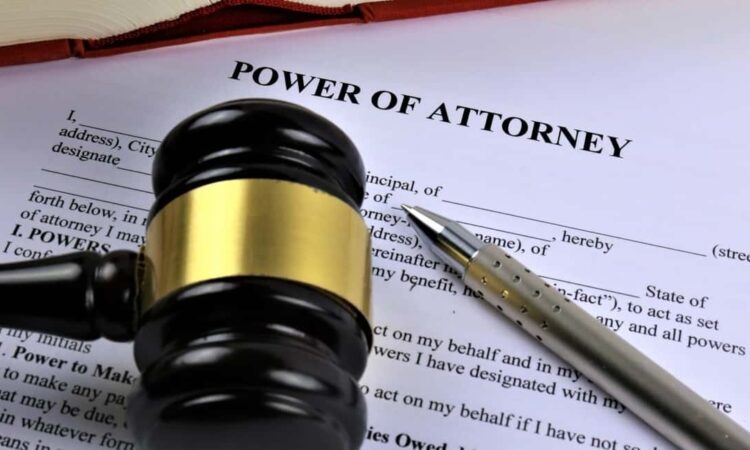
A power of attorney is an important legal document in estate planning that allows you to assign someone to manage your financial and legal affairs if you become incapacitated. But what happens when the principal who granted the power of attorney passes away?
Under Florida law, a power of attorney immediately ends upon the principal’s death. The agent named in the power of attorney no longer has legal authority to act on behalf of the deceased person. So, what happens next with the principal’s assets and estate?
How a Power of Attorney Works
First, it helps to understand what a power of attorney is. A power of attorney is a legal document that authorizes someone (known as your “agent” or “attorney-in-fact”) to handle financial, legal, and other matters on your behalf (as the “principal”). The agent can manage bank accounts, pay bills, and sign documents for real estate transactions.
The power of attorney document specifies what powers are granted to the agent. These can be broad powers to handle all financial and legal affairs or limited and specific powers. A durable power of attorney remains valid even if the principal becomes incapacitated or disabled. This allows the agent to manage the principal’s affairs if they cannot do so themselves.
All powers of attorney end upon the death of the principal who granted them. At that point, the agent no longer has legal authority to act on the deceased person’s behalf.
What Happens to the Power of Attorney After Death
In Florida, Section 709.2109 states that a power of attorney ends when the principal dies.
Some key points about powers of attorney after death:
- The agent can no longer exercise any powers granted in the POA document after the principal dies. Their legal authority ends.
- The power of attorney document becomes ineffective immediately upon the principal’s death.
- After learning of the principal’s death, financial institutions, like banks or brokerages, will not accept the agent’s authority under the POA document.
- Any actions the agent takes after the principal’s death generally have no legal validity.
So, in summary, a power of attorney expires and cannot be used by the agent after the principal passes away. This applies to both standard and durable POA documents in Florida.
What Should You Do with the POA Document?
Once the principal dies, the durable power of attorney document should be formally revoked by writing “revoked” across the document. This prevents any abuse or confusion.
The original POA should be collected by the executor and submitted to the probate court along with the last will and testament to be entered into official records.
You should also notify all institutions that you previously sent copies of the POA document – such as banks, brokerages, and title companies – that the principal has died and the document is no longer valid. This will stop the POA from being used fraudulently.
Why Does a POA End When You Die?
There are a few key reasons why a power of attorney terminates at death:
- A POA is a legal document based on agency law – The POA creates a principal-agent relationship. The agent derives their authority to act from the living principal. This agency relationship ends when the principal dies.
- The personal representative takes over – When someone dies, the executor named in their will takes over legal responsibility for administering the estate. This role supersedes an agent under a POA.
- Avoiding abuse/fraud – Ending the POA at death prevents abuse and protects heirs and beneficiaries. This ensures the agent cannot misuse the document after the principal’s passing.
- POA powers end – A POA grants limited powers during life. Broader post-death estate administration powers are granted through other documents like a will.
So, in summary, the nature of the POA as an agency document means it cannot survive the principal’s death in Florida. The executor named in your will steps in to wrap up your affairs.
What Happens to the Principal’s Assets?
So, what happens to the deceased person’s assets and estate after their power of attorney ends? The management and distribution of assets after someone dies are handled through the probate process. Probate is the court-supervised process for administering a deceased person’s estate.
During probate, the court will name a personal representative (also called an executor) who will inventory assets, pay debts and taxes owed, and ultimately distribute the remaining assets to beneficiaries.
Here is an overview of the typical probate process after someone dies:
- File a petition in probate court – This involves filing the will, notifying heirs, and the court appointing a personal representative.
- Inventory assets – The personal representative locates and catalogs all assets owned at death.
- Pay debts and taxes – Outstanding debts and taxes are paid from the estate.
- Distribute remaining assets – After debts and taxes are paid, the remaining assets are distributed to beneficiaries named in the will or determined by state inheritance laws if there is no will.
Throughout this process, the estate is overseen by the probate court to ensure assets are properly managed and distributed. The court must approve the personal representative’s actions during probate.
So, in summary, once a power of attorney ends at death, the probate process kicks in to handle the deceased person’s assets and estate. The agent under the power of attorney no longer has any authority.
Naming a Personal Representative in an Estate Plan
Creating an estate plan that includes nominating a personal representative to oversee probate is important to ensure your assets are managed properly after your death. This person should be different than your power of attorney agent.
As part of your overall estate plan, you should have documents that name a personal representative, including:
- Last will and testament – This names an executor to handle probate and distribute your assets. Be sure to keep it updated.
- Revocable living trust – Name a successor trustee to manage assets in the trust after death and distribute them to beneficiaries.
The personal representative you choose should be someone you trust to execute your wishes faithfully. Consider choosing a professional executor or corporate trustee for complex estates.
Let Stivers Law Help You Protect Your Legacy
Many important legal and financial considerations can complicate end-of-life planning and probate. It is highly recommended that you create your plan in collaboration with an experienced estate planning and probate lawyer.
The attorneys at Stivers Law in Florida guide clients through all aspects of thoughtful estate planning tailored to their needs and goals. Whether you want to plan your legacy, provide for loved ones, or protect hard-earned assets from potential litigation, their team can help.
With a properly drafted estate plan in place, you can have peace of mind knowing that your affairs will be handled smoothly in the event of your incapacity or death. Contact an attorney today to get started planning for your family’s future.





